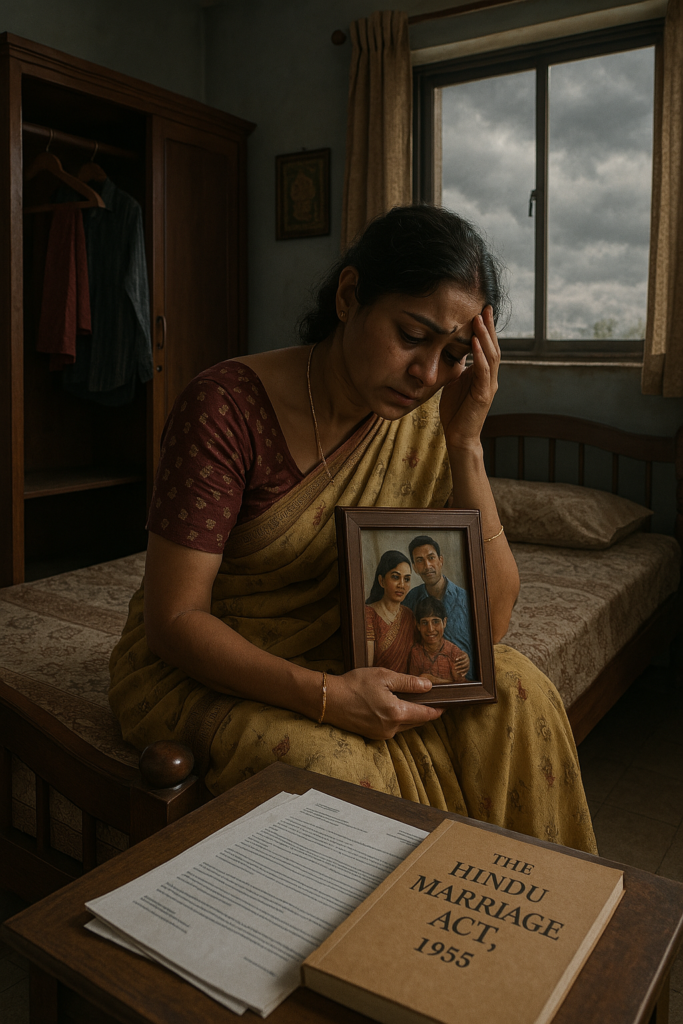When a spouse leaves without informing, it can create emotional and legal turmoil for the abandoned partner. Indian law, particularly the Hindu Marriage Act, 1955, offers structured legal remedies to address such circumstances. Whether you’re a law student seeking to understand statutory provisions or a client facing abandonment, this article—prepared in consultation with divorce lawyers in Chandigarh and HC advocates in Chandigarh—offers in-depth clarity on your rights, processes, and legal pathways.
Legal Framework Under the Hindu Marriage Act, 1955
The Hindu Marriage Act, 1955 codifies the legal aspects of Hindu marriages and the circumstances under which a marriage may be enforced, suspended, or dissolved. It applies to Hindus, Buddhists, Jains, and Sikhs.
When a spouse leaves without informing, the relevant legal tools available under this Act include:
- Section 9 – Restitution of Conjugal Rights
- Section 10 – Judicial Separation
- Section 13 – Divorce, including on the ground of desertion
- Section 24 & 25 – Maintenance and Permanent Alimony
- Section 26 – Custody of children
Related laws like Section 144 of the BNSS, the Protection of Women from Domestic Violence Act, 2005, and the Guardian and Wards Act, 1890 also offer additional protections.
Restitution of Conjugal Rights – Section 9
If a spouse has withdrawn from the society of the other without a reasonable excuse, the aggrieved party may file a petition under Section 9. This legal remedy aims to restore the marital relationship by securing the return of the absent spouse.
To succeed, the petitioner must prove:
- A valid Hindu marriage exists
- The spouse has left without just cause or mutual consent
- The petitioner is not at fault
Divorce advocates in Chandigarh often use this provision when reconciliation is preferred over divorce. If the decree remains unexecuted for over a year, it can become a ground for divorce under Section 13(1A)(ii).
Judicial Separation – Section 10
Judicial separation is a formal court order relieving spouses of marital obligations without dissolving the marriage. It is often the first legal step taken when a spouse disappears or leaves without notice.
Key implications:
- No obligation to cohabit
- May lead to permanent alimony or maintenance
- Leaves room for reconciliation
Filing is typically handled by divorce lawyers in Chandigarh before the Family Court or Chandigarh HC, depending on the complexity of the case.
Divorce on Grounds of Desertion – Section 13(1)(ib)
If your spouse has deserted you for at least two years, you can seek divorce under Section 13(1)(ib).
Desertion requires:
- Physical separation
- Intention to abandon the relationship
The burden of proof lies on the petitioner to demonstrate both components. Legal assistance from seasoned HC lawyers in Chandigarh is crucial in gathering evidence, drafting the petition, and representing your case before the Punjab and Haryana High Court (Chandigarh HC).
Maintenance and Alimony – Sections 24 and 25
Indian law recognizes the right of an abandoned spouse to claim maintenance or permanent alimony.
- Section 24: Interim maintenance during proceedings
- Section 25: Permanent alimony after the decree
Even working spouses may qualify for support if their income doesn’t suffice. These matters are often presented by divorce advocates in Chandigarh or Chandigarh HC family lawyers, depending on jurisdiction.
Section 144 of BNSS, applicable to all religions, can also be invoked for swift maintenance orders.
Custody of Children – Section 26 and Guardian & Wards Act
When a spouse leaves without informing, child custody becomes urgent. Section 26 allows for custody petitions during or after separation/divorce.
The court considers:
- Child’s welfare
- Age and preferences (if mature)
- Parental conduct and stability
Matters of custody often involve HC advocates in Chandigarh, particularly in disputed or high-stakes cases. The Guardian and Wards Act, 1890 also supplements decision-making in such cases.
Protection from Domestic Violence Act, 2005 (PWDVA)
If abandonment is coupled with emotional, physical, or financial abuse, the spouse can file under PWDVA, 2005.
Available remedies:
- Residence orders
- Protection against further abuse
- Monetary compensation
- Emergency custody
Divorce lawyers in Chandigarh often advise combining PWDVA applications with petitions under the Hindu Marriage Act to maximize legal protection.
Why Legal Counsel Matters in Chandigarh
Whether filing for judicial separation, divorce, or child custody, working with HC lawyers in Chandigarh or specialized family law advocates in Chandigarh HC ensures compliance with procedural and evidentiary requirements. Courts in Chandigarh High Court (Punjab and Haryana) are known for their legal sophistication, and experienced lawyers can guide your case effectively through this judicial system.
FAQs on What If Spouse Leaves Without Informing
Q1: My spouse left without informing and hasn’t returned in two years. Can I file for divorce?
Yes. Under Section 13(1)(ib) of the Hindu Marriage Act, desertion for two years is a valid ground. Divorce advocates in Chandigarh can help you initiate the process.
Q2: Can I ask the court to bring back my spouse?
Yes. A petition under Section 9 for restitution of conjugal rights can be filed. Family lawyers in Chandigarh HC can help file the application and present your case effectively.
Q3: What if my spouse refuses to comply with the restitution decree?
You may then file for divorce under Section 13(1A)(ii). In such cases, it’s wise to consult with HC advocates in Chandigarh to ensure your petition is well-supported.
Q4: Can I claim maintenance if I am working?
Yes. Even if you are earning, you may still be entitled to maintenance, especially if your earnings are insufficient to maintain the standard of living from your marriage. Seek advice from divorce lawyers in Chandigarh for a proper evaluation.
Q5: Who will get the custody of my children?
Custody depends on the child’s welfare, age, and preferences. Courts usually favor the mother for younger children unless evidence suggests otherwise. Chandigarh HC lawyers specializing in family law can guide you through custody petitions.




